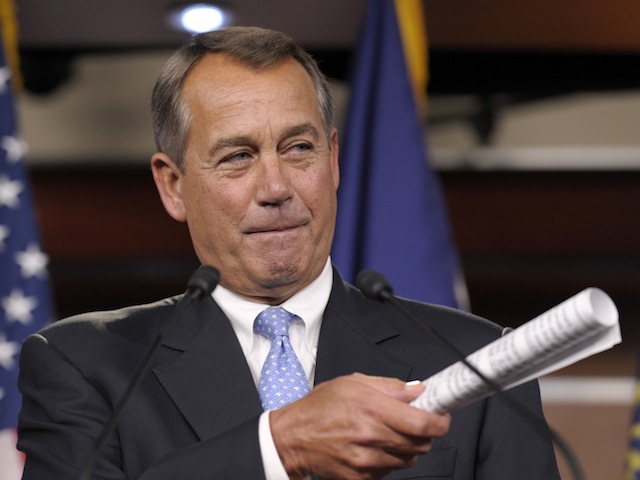
Normally, when a legislative leader cannot convince his party rank-and-file to support his proposals, that leader resigns with honor or is ousted in disgrace. Speaker of the House John Boehner may have crossed that threshold with the failure of his “Plan B” last week. But it is highly unlikely that he will go, partly because there is no leading candidate to replace him, and also because it is clear that many of his failures are not his fault.
Boehner is a dealmaker by nature, not the ideological leader that Newt Gingrich was, nor the partisan enforcer that Nancy Pelosi was (and remains, even in the minority). In a divided Washington, he would seem to be the right man for the job. But President Barack Obama is either uninterested in, or temperamentally incapable of, reaching compromise on anything of substance. And the Tea Party cohort that, with some reluctance, put Boenher in the Speaker’s office in 2010, has also set limits on the kind of deals he can make with Democrats.
Given the White House’s intransigence in “fiscal cliff” negotiations–Obama has not even bothered to offer a new proposal with time running out–Boehner could make a powerful statement by resigning: he would show the nation there is no one who can work with a president determined to undermine his negotiating partner.
Yet none of the potential contenders has shown much interest–at least openly–in the Speaker’s job. Here are some of the possible front-runners, were Boehner to resign or face a serious challenge in a secret ballot:
Eric Cantor: The House Majority Leader was once favored by some conservatives over Boehner for the Speaker’s post. In 2009, he achieved the critical task of uniting House Republicans against Obama’s stimulus (a.k.a. “porkulus”) legislation. And in 2011, he emerged as a voice for conservatives who wanted to hold the line against raising the debt ceiling without a balanced budget amendment–even as he negotiated terms of a deal with Vice President Joe Biden. But Cantor has almost always deferred to Boehner, even when trust between the two declined during debt ceiling talks (Boehner had, without Cantor’s knowledge, opened a back channel with Obama directly). Cantor has also lost some support over the activities of the Young Guns Network, which became involved in several primaries in 2012, often backing moderates over conservatives.
Paul Ryan: Arguably the most respected member of the House among Republicans today, and the only chair of a committee (Budget) to have received a term-limit waiver, Ryan could likely stage a successful campaign for the Speaker’s gavel. But Ryan has shown little interest in internal political machinations, and has been content to back Boehner, providing policy heft behind the scenes. Ryan may also have his sights set on the 2016 presidential race–he is already one of the party’s top contenders for the nomination–and may not want to spend the next two-plus years mired in the procedural and political muck of the Speakership.
Jim Jordan: The outgoing chair of the Republican Study Committee confronted Boehner last year during the debt ceiling debate, when he and outside conservative groups pushed for the “Cut, Cap, and Balance” plan that passed the House. Boehner quashed Jordan’s effort–which, in fairness, had no chance of passage in the Senate–and Jordan has shown little interest since then in challenging the leadership openly on policy or politics. The fact that Jordan, like Boehner, is from Ohio also makes a challenge for the gavel less likely.
“Dark Horse”: The Speaker of the House does not actually have to be a member of the House. It is possible, though highly unlikely, that another leader could emerge as a candidate. A few have even suggested Speaker Newt Gingrich, who ran a highly competitive presidential campaign, and whose troubled relationship with President Bill Clinton in the 1990s looks comparatively warm compared to Boehner’s perpetual standoff with Obama. The Donald is waiting in the wings, too–and unlike almost everyone else, he’s prepared to use the debt ceiling as the wicked bargaining chip it actually is. Is it time to think outside the Dome?

COMMENTS
Please let us know if you're having issues with commenting.